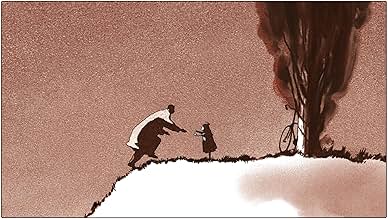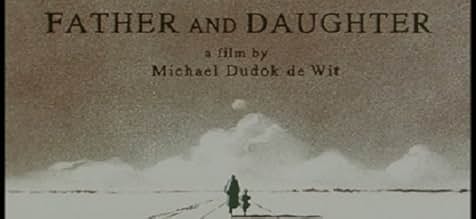Father and Daughter
- 2000
- 8min
CALIFICACIÓN DE IMDb
7.8/10
7.3 k
TU CALIFICACIÓN
Agrega una trama en tu idiomaA father says goodbye to his young daughter. Time passes and the daughter moves through life age by age, but within her there is always a deep longing for her father.A father says goodbye to his young daughter. Time passes and the daughter moves through life age by age, but within her there is always a deep longing for her father.A father says goodbye to his young daughter. Time passes and the daughter moves through life age by age, but within her there is always a deep longing for her father.
- Dirección
- Guionista
- Elenco
- Ganó 1 premio Óscar
- 22 premios ganados y 2 nominaciones en total
- Dirección
- Guionista
- Todo el elenco y el equipo
- Producción, taquilla y más en IMDbPro
Opiniones destacadas
This short film apparently took 8 years to make and it shows.
I saw it as part of an arts degree programme at NEWI, Wrexham where it was used to demonstrate to the Level 1 audience what empathy (the subject of the next essay) could be.
The artwork shows what can be achieved with the utmost economy of line, no massive Disney or Pixar art work here. It is truly incredible the depth of emotion that such an apparently very simple, short film can bring out. It certainly made the 'empathy' point, I defy anybody with any kind of normal human feelings not to be moved by this film.
I heartily recommend this film if you can get to see it.
I saw it as part of an arts degree programme at NEWI, Wrexham where it was used to demonstrate to the Level 1 audience what empathy (the subject of the next essay) could be.
The artwork shows what can be achieved with the utmost economy of line, no massive Disney or Pixar art work here. It is truly incredible the depth of emotion that such an apparently very simple, short film can bring out. It certainly made the 'empathy' point, I defy anybody with any kind of normal human feelings not to be moved by this film.
I heartily recommend this film if you can get to see it.
This is one of the most amazing shorts I've seen. The story of love between a girl and her father is so amazing. As the father leaves his daughter, she still comes back to the last place she saw him as she grows older. The story is touching, and the music is amazing. Not to mention the animation, which was so beautiful. I thought this film was certainly deserving of its Academy Award, despite "Rejected" being one of my favorites also. But this film is so touching, so beautiful, I could watch it again and again and not get tired of it. The ending was so touching- but I won't spoil it. Watch this film and you will never forget it.
In 2000, Father and Daughter won the Academy Award for Best Short Film for its Dutch director Michael Dudok de Wit. For such a short (eight minutes) movie it has a remarkable capacity to move an audience. The story of a father who leaves his daughter and rows off into the ocean, it commences with two figures riding their bicycles, the smaller of the wheels in perfect symmetry with the larger. The father and daughter climb to the top of a hill at which point the father alights, hugs his daughter before climbing down to the seashore. He cannot resist running back and holding the girl one last time before rowing off towards the distant horizon. The girl runs up and down against the skyline as the sun gradually sets. There is no explanation. She returns again and again to her vantage point on the cliff to peer out to sea for his return. Each return marks a passage in her life from child to adolescent, mother and eventually old woman. And still she returns to search for the father who left her.
The landscape of the Netherlands with its wide skies and tall poplar trees is the backdrop to the movie. The sky and landscape is a delicate colour wash of brown, grey, sepia, sometimes hints of green or blue. The drawing is pencil and charcoal, the drawings scanned and colour added digitally. Remarkably in a film that deals in emotion, there is no facial detail whatsoever. Often the figures are drawn in silhouette. This can be remarkably effective in conveying mood: the old woman toiling up the hill, the flapping arms of the child, the teenager gliding down the slope on her bike, which in another later scene will simply not stand upright. Always the brushwork is spare, perhaps a stroke that transforms into a slender girl or a smudge for the squared old woman. Each shot is exquisite: the long shadows of trees or bicycle; seascape and sky, vast and empty. The seasons change with a rustle of leaves or the girl struggling up the hill against a wind that bends trees. The music by Norman Roger is sympathetic to the theme, essentially a lilting tune but arranged with tone and depth.
This astonishingly accomplished and poetic movie fulfils in every sense. Michael Dudok de Wit was born in 1953 and educated in Holland. In 1978, he graduated from the West Surrey College of Art in England. His films include Tom Sweep (1992), The Monk and the Fish (1994) and The Aroma of Tea (2006). You might also have seen the rather classy commercial for United Airlines, A Life. Given his draftsman-like qualities, Michael is much in demand as an illustrator for books. My Christmas present from my family, and well recommended, was Best of British Animation Awards Vol.4 that includes Michael's Oscar winning short.
Read this and other online film reviews at www.ShortoftheWeek.com
The landscape of the Netherlands with its wide skies and tall poplar trees is the backdrop to the movie. The sky and landscape is a delicate colour wash of brown, grey, sepia, sometimes hints of green or blue. The drawing is pencil and charcoal, the drawings scanned and colour added digitally. Remarkably in a film that deals in emotion, there is no facial detail whatsoever. Often the figures are drawn in silhouette. This can be remarkably effective in conveying mood: the old woman toiling up the hill, the flapping arms of the child, the teenager gliding down the slope on her bike, which in another later scene will simply not stand upright. Always the brushwork is spare, perhaps a stroke that transforms into a slender girl or a smudge for the squared old woman. Each shot is exquisite: the long shadows of trees or bicycle; seascape and sky, vast and empty. The seasons change with a rustle of leaves or the girl struggling up the hill against a wind that bends trees. The music by Norman Roger is sympathetic to the theme, essentially a lilting tune but arranged with tone and depth.
This astonishingly accomplished and poetic movie fulfils in every sense. Michael Dudok de Wit was born in 1953 and educated in Holland. In 1978, he graduated from the West Surrey College of Art in England. His films include Tom Sweep (1992), The Monk and the Fish (1994) and The Aroma of Tea (2006). You might also have seen the rather classy commercial for United Airlines, A Life. Given his draftsman-like qualities, Michael is much in demand as an illustrator for books. My Christmas present from my family, and well recommended, was Best of British Animation Awards Vol.4 that includes Michael's Oscar winning short.
Read this and other online film reviews at www.ShortoftheWeek.com
There is a man who had a young daughter. He went, leaving her. She believed that he would certainly come back, so she continued to go to the place parted from him.
I was sad and painful. Because daughter went to place parted from her father, but her wish wasn't fulfilled. She grew up and the lake disappeared. This part and film's music made me sad. Perhaps, without music I couldn't feel painfulness.
I have two mysterious points. First, why do they use bicycle? They used bell of bicycle instead of saying words. Whether it rained or the wind blew, she used bicycle. I think that it is necessary to use bicycle. Second, why do writer not draw people's face? If the writer drew people's face, I would understand this film better.
I think so, this film is wonderful. Because this film impressed me without dialogue and people's expression. Last scene made my heart tight. I became that it is likely to tear.
I was sad and painful. Because daughter went to place parted from her father, but her wish wasn't fulfilled. She grew up and the lake disappeared. This part and film's music made me sad. Perhaps, without music I couldn't feel painfulness.
I have two mysterious points. First, why do they use bicycle? They used bell of bicycle instead of saying words. Whether it rained or the wind blew, she used bicycle. I think that it is necessary to use bicycle. Second, why do writer not draw people's face? If the writer drew people's face, I would understand this film better.
I think so, this film is wonderful. Because this film impressed me without dialogue and people's expression. Last scene made my heart tight. I became that it is likely to tear.
Father and Daughter is one of the most touching pieces of art I have ever seen. Although the movie only lasts eight minutes, the effect on its audience will probably last a lifetime. To describe 'Father and Daughter' as beautiful is just an understatement. Go see this gem and be amazed yourself.
¿Sabías que…?
- TriviaSelected into the Canon of Dutch Cinema in 2007, which is comprised of "sixteen important and defining movies that show the versatility of Dutch movie history".
- Créditos curiososA bicycle wheel is seen turning round and round at the end of the closing credits.
- Bandas sonorasThe Danube Waves
Theme by Iosif Ivanovici (as Iosif Ivanivici)
Selecciones populares
Inicia sesión para calificar y agrega a la lista de videos para obtener recomendaciones personalizadas
Detalles
Contribuir a esta página
Sugiere una edición o agrega el contenido que falta

Principales brechas de datos
What is the Spanish language plot outline for Father and Daughter (2000)?
Responda














